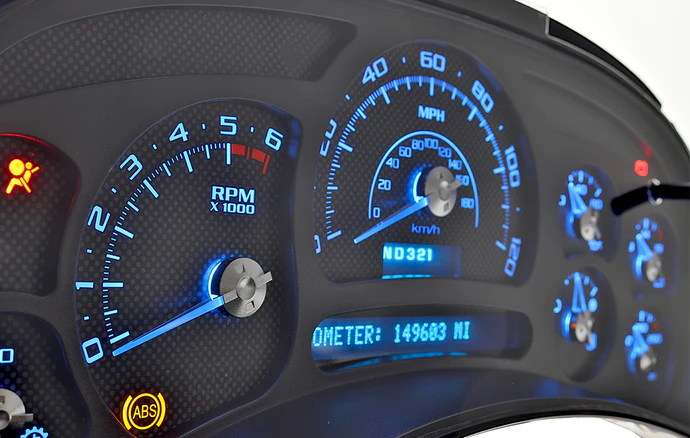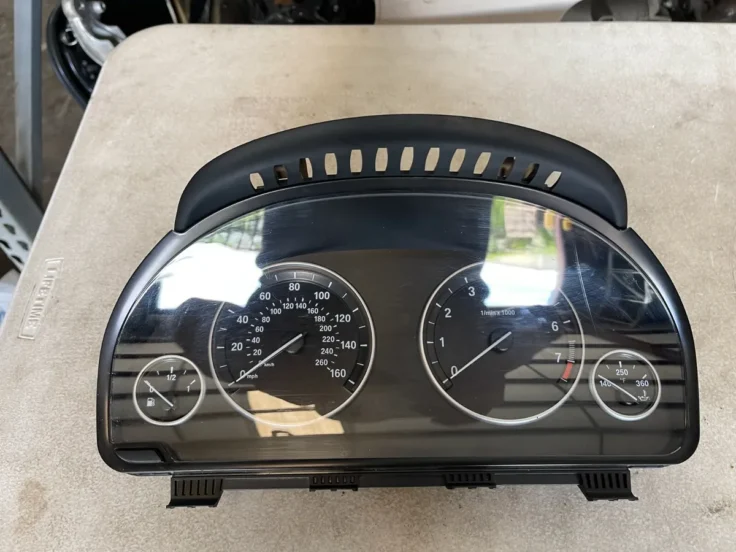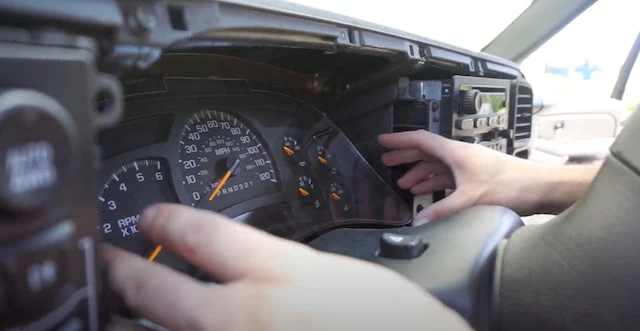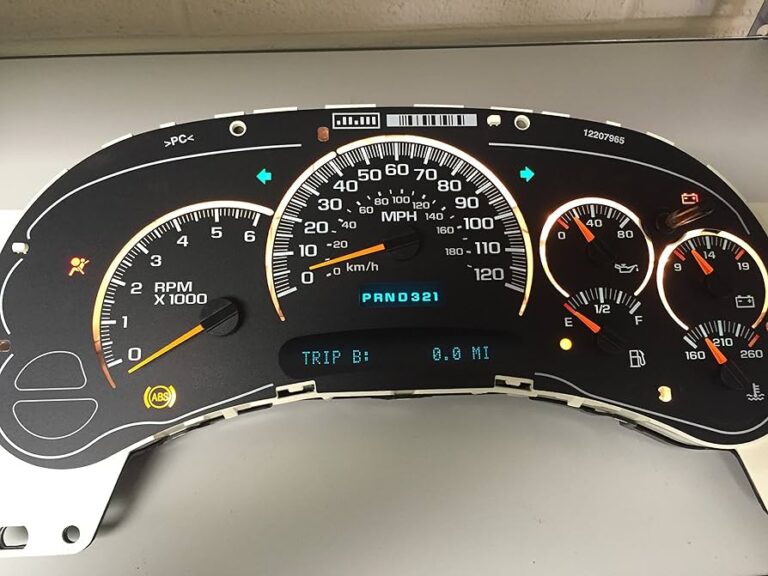When it comes to maintaining our vehicles, our focus typically centers on essential tasks like oil changes, brake replacements, and tire condition checks. Yet, one crucial element in our vehicles often goes unnoticed—the dashboard, specifically, the instrument cluster. This holds immense significance as it provides you with constant, up-to-the-minute information about your vehicle’s operation and the current driving conditions.
Picture this: You’re cruising down the highway, and suddenly, your speedometer drops to zero, even though you were previously traveling at 60 miles per hour. Or your fuel gauge shows empty right after you fill up the tank. These are signs that something’s gone wrong with your instrument cluster. It’s not just annoying; it can be seriously unsafe.
The instrument cluster, found on your car’s dashboard, includes essential components like the speedometer, tachometer, fuel gauge, and temperature gauge. Over time, it may require replacement, and you may ponder choosing between the original manufacturer’s option or more economical aftermarket alternatives. Let’s explore this choice.
Why the Instrument Cluster Is Important

Before delving into the topic of instrument cluster replacement, it’s essential to understand the significant role they play in a vehicle. Furthermore, it’s worth mentioning that InstrumentSales specializes in electronic and mechatronic components, which are crucial elements found within the instrument cluster and vehicle electronics.
Information Hub
The instrument cluster in your car serves as the central hub for important vehicle information, allowing you to stay informed while keeping your focus on the road. It provides essential data such as speed, fuel levels, engine temperature, and more.
Safety
Safe driving hinges on precise instrument cluster data. Having knowledge of your speed enables you to operate your vehicle safely, adhere to speed limits, and thereby reduce the risk of accidents and traffic violations.
Maintenance
The instrument cluster serves as a vital tool for alerting drivers to potential vehicle issues. Rapid increases in engine temperature or sudden fuel gauge declines can be early indicators of significant problems.
Now that we’ve underscored the crucial role of the instrument cluster, let’s delve into the topic of OEM replacement parts.
OEM vs. Aftermarket Parts
What Are OEM Parts?

OEM (Original Equipment Manufacturer) parts originate from the same company that designed and built your car. They are specifically tailored to fit your vehicle with precision, adhering to all required specifications. These parts uphold the same high-quality standards as the originals. When you choose OEM parts, you can have confidence in their reliable performance and seamless integration into your vehicle.
The Downsides of Aftermarket Parts
Now, on the other side, we’ve got aftermarket parts which are manufactured by companies other than the car manufacturer. Sometimes, compared to OEM parts, they may not measure up in terms of quality or precision. While they can often be cheaper, there are some risks involved in using aftermarket instrument clusters:
Compatibility Issues: Aftermarket instrument clusters may not fit perfectly in your vehicle, leading to issues with installation and functionality.
Inconsistent Quality: The quality of aftermarket parts can vary significantly, making it challenging to ensure reliability and accuracy.
Warranty Concerns: Installing aftermarket parts can void your vehicle’s warranty, leaving you responsible for any future repairs.
Why Investing in OEM Replacement is Wise
Here’s why quality—and opting for OEM—truly matters.
Precision and Accuracy
The primary reason for an instrument cluster is to relay accurate information to the driver. A good or imprecise instrument can lead to better decisions on the road. For instance, if your speedometer isn’t correct, you might inadvertently speed up and put yourself and others in danger or risk getting a ticket.
OEM replacements are built to the exact specifications of your vehicle. These parts have undergone rigorous testing and calibration to ensure they function just as the original. Aftermarket parts, while sometimes cheaper, may sometimes have different levels of precision and quality control.
Compatibility and Fit
Every car model is unique, with its distinct specifications and requirements. OEM parts are designed for your vehicle model, ensuring a perfect fit and seamless integration. On the other hand, aftermarket parts are often designed to fit a range of vehicles, leading to potential compatibility issues.
An ill-fitting instrument cluster can lead to visual misalignments, making it hard to read the gauges. Worse, if the electrical connectors are a better match, it can lead to malfunctions or even short circuits.
Longevity and Durability
OEM replacements use the same high-quality materials as the original ones. This makes them built to last, so you won’t have to change them out constantly. Choosing a lower-quality aftermarket part may seem cost-effective in the short run. Still, replace it sooner than you’d like.
Retaining Vehicle Value
Maintaining its original components can be a selling point for those considering selling or trading in their vehicle. Prospective buyers often look for cars that have been held with OEM parts as it speaks to the care and attention the previous owner has given the car.
Peace of Mind
Let’s remember the peace of mind that comes with knowing you’ve picked a custom-made part for your vehicle. When you go for an OEM instrument cluster replacement, you can drive confidently, assured that all the information it provides is accurate and trustworthy.
The Consequences of Choosing Lower-Quality Replacements

Inaccurate Information
One of the most significant risks of opting for a lower-quality instrument cluster replacement is inaccurate information. Imagine your new cluster can’t accurately show your speed, fuel, or temperature. That leaves you in the dark while driving, which can be dangerous and expensive.
Compatibility Problems
As mentioned earlier, aftermarket instrument clusters may not fit your vehicle perfectly. These compatibility issues can lead to problems such as malfunctioning gauges, warning lights, or even electronic glitches, which can be both frustrating and time-consuming to rectify.
Long-Term Reliability
The durability of your instrument cluster is directly tied to its quality. OEM replacements are built with longevity in mind, guaranteeing consistent performance over the years. Opting for a lower-quality substitute could result in frequent replacements and extra costs.
Final Thoughts
Your car’s instrument cluster is very important as it ensures you stay informed and safe while driving. We should always focus on quality when considering a replacement. Going for an OEM replacement guarantees accuracy, compatibility, and durability. It also helps preserve your vehicle’s worth and provides peace of mind.
Remember, sometimes the actual cost isn’t just in the price tag but in the potential long-term implications of choosing a lower-quality part. Quality truly matters regarding the instrument cluster—a component you rely on every time you drive.

